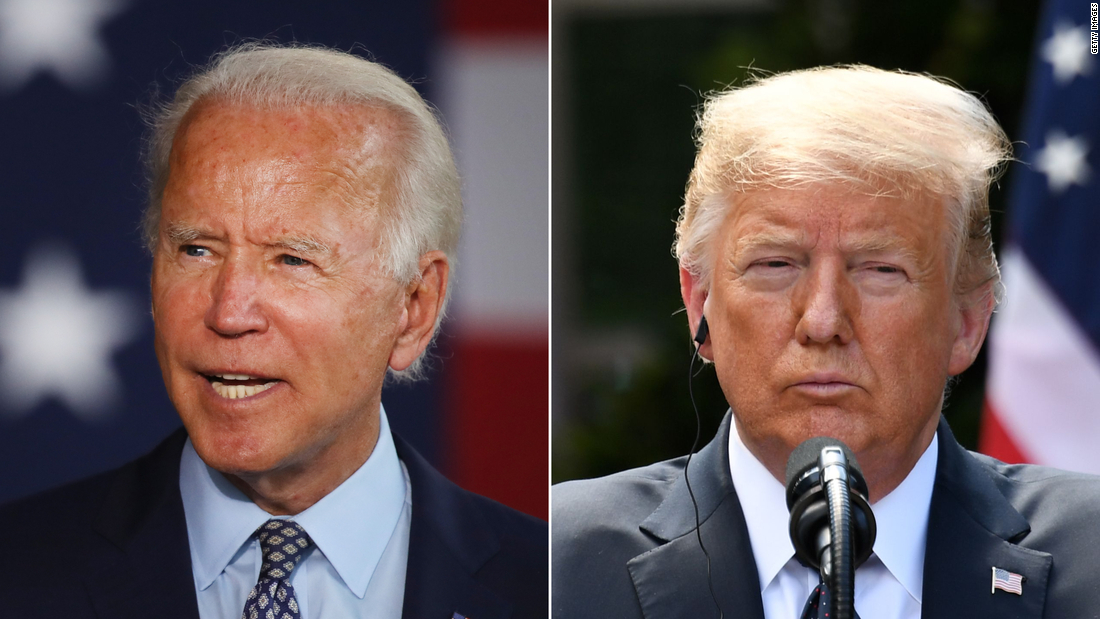The President has already set the stage to dispute election results this fall
Interviews with nearly 20 election experts, former lawmakers, political strategists, legal scholars and historians indicate there are widespread fears of a nightmare scenario in November, where Trump’s norm-breaking behavior — coupled with the unprecedented challenges of pandemic-era voting — test the limits of American democracy and plunge the country into a constitutional crisis.
“There’s a significant scope for an unprecedented post-election crisis in this country,” said Larry Diamond, an expert on democratic institutions at the conservative-leaning Hoover Institution.
More Americans than ever are expected to cast mail-in ballots this year, so it will take longer for results to trickle in. Experts are eschewing “election night” for “election week,” because it could realistically take days, and maybe weeks, until news outlets project a winner. Both presidential campaigns have set aside millions of dollars and recruited lawyers for the looming legal fights.
“If it’s a very close election, there’s no question in my mind that he’ll contest it,” said former Pennsylvania Sen. Rick Santorum, a CNN contributor who backed Trump in 2016 and supports his reelection. “Even if it’s not a very close election, I think he’ll want to contest it, but I don’t think he’ll have a broad base of support to protest this election, and he wouldn’t get very far.”
Delayed results in November
There is good reason to brace for chaos. This cycle has already broken new ground for how elections are conducted, with massive changes being implemented because of the coronavirus.


People wait in line to vote in Georgia’s Primary Election on June 9, 2020 in Atlanta.
“Many of these states are not prepared for what this election will be,” said Amy Walter, national editor of the nonpartisan Cook Political Report. “They have never done vote-by-mail like this. It’s messy and mistakes are going to be made. People are going to stand in long lines. Ballots won’t arrive. There will be people in every state who can make a case that the process was flawed.”
This uncertainty is fueling trepidation about what will happen after the polls close on November 3.
“There is deep skepticism and concern, across the political spectrum, about how this election is going to unfold,” said Joe Goldman, president of the Democracy Fund, a nonpartisan foundation that has extensively studied voter attitudes toward political norms and democratic institutions.
Trump’s checkered past

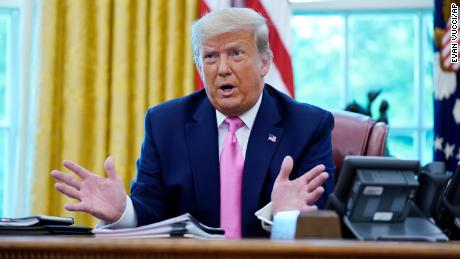
President Donald Trump speaks to the media while meeting with Senate Majority Leader Mitch McConnell and House Minority Leader Kevin McCarthy in the Oval Office, Monday, July 20, 2020.
With all these changes, experts see an opening for Trump to dispute the results, even if the election isn’t marred by widespread fraud, which is essentially a non-factor in US elections.
Having lost this battle, Trump could blame mail-in voting if he loses in November. That would fit with his well-established past of questioning the legitimacy of elections, dating back eight years, even though there was no proof of widespread irregularities or fraud in any of these elections.
- Presidential election, 2012: Trump backed Republican nominee Mitt Romney and spread false conspiracies on Election Day that machines were deleting Romney votes. After the race was called, Trump denounced the results as a “total sham” and tweeted, “We can’t let this happen. We should march on Washington and stop this travesty.”
- Iowa caucuses, 2016: Trump said the caucuses were illegitimate after he finished behind Texas Sen. Ted Cruz. After the vote, Trump said, “Ted Cruz didn’t win Iowa, he stole it,” and accused Cruz of committing “fraud.” Trump called for a new election, said Cruz’s results should be “nullified” and said “the State of Iowa should disqualify” Cruz.
- Presidential election, 2016: At the final debate between Trump and Democratic nominee Hillary Clinton, Trump infamously refused to commit that he would accept the results. Instead, he said, “I will tell you at the time. I’ll keep you in suspense.” Even after Trump won, he falsely claimed there were millions of illegal votes in California and other states, creating a false narrative to explain why he lost the popular vote to Clinton.
- Florida Senate election, 2018: On election night, Florida Republican Rick Scott led Democratic Sen. Bill Nelson by 38,000 votes, with many ballots still uncounted. Scott’s lead narrowed over the next two weeks as mail ballots were tallied. But Trump quickly claimed there was massive “fraud” and “corruption,” and accused Democrats of “stealing” the election by “finding” new votes. Trump declared that the election “should be called in favor of Rick Scott” and said Florida “must go with Election Night” results. After a statewide recount, Scott was up by about 10,000 votes, and Nelson conceded.
- Arizona Senate election, 2018: Republican Martha McSally was ahead on election night, but Democrat Kyrsten Sinema later took the lead. Once that happened, Trump decried “corruption” and tweeted, “call for a new election?” McSally later conceded.

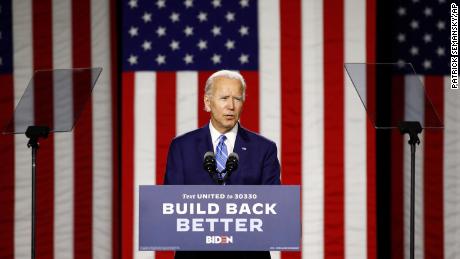
Democratic presidential candidate, former Vice President Joe Biden speaks during a campaign event, Tuesday, July 14, 2020, in Wilmington, Delaware.
In an email to CNN, the Trump campaign refused to say that it stood by its unequivocal statement from June about accepting the results.
“We don’t know what kind of shenanigans Democrats will try leading up to November,” Trump campaign spokesman Tim Murtaugh told CNN. “If someone had asked George W. Bush and Al Gore this same question in 2000, would they have been able to foresee the drawn out fight over Florida? The central point remains clear: in a free and fair election, President Trump will win.”
Post-election scenarios
There is very little precedent in American history for a disputed presidential election.
This time around, Trump could dispute the results and refuse to concede. He could urge his supporters to flock to Washington and defend the White House. He could complain about supposed fraud but then peacefully leave Washington on Biden’s first day. Or, he could file lawsuits in state and federal courts and try to prove that the results were tainted by irregularities.
“You can start with rhetoric, but then eventually it turns into a legal process,” said Mike Shields, a CNN contributor and former Republican National Committee chief-of-staff, who supports Trump. “Saying something happened and challenging it legally in court are two different things.”
Supreme Court showdown?

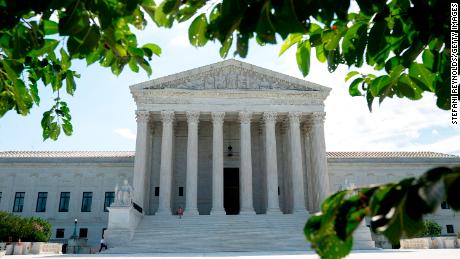
A general view of the U.S. Supreme Court on June 30, 2020 in Washington, DC.
Nonpartisan experts and political strategists told CNN they are afraid that the Supreme Court might once again be called upon to decide the election. Election lawsuits in state and local courts could be appealed up to the Supreme Court, which has a 5-4 conservative majority.
Much of what Trump does in November will depend on the margin. If the race tightens, and comes down to one or two close states, Trump’s base might go along with a protracted legal challenge. But if Biden’s lead holds up, and he wins convincingly, Trump has fewer options.
“There’s a large segment of the Republican Party who understand that elections aren’t wildly fraudulent, and if Trump loses in a Romney or McCain-type fashion, then there’s no room to contest it,” Santorum said, referring to the lopsided Republican losses in 2012 and 2008.
It’s the Democrats, too

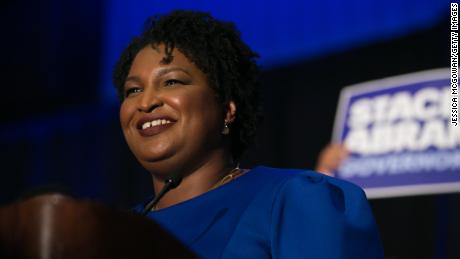
Georgia Democratic Gubernatorial candidate Stacey Abrams takes the stage to declare victory in the Democratic primary during an election night event on May 22, 2018 in Atlanta, Georgia.
“This rhetoric has become widespread, not just with Trump and the conspiracy caucus in the Republican Party, but with some Democrats as well,” said Doug Heye, a GOP strategist and CNN political commentator. “A big part of the Democratic Party absolutely believes Stacey Abrams had that election stolen from her, and she has never stood up to say that it wasn’t.”
“If Trump once again loses the popular vote and wins the Electoral College, there will be a lot of clamoring that our democracy is broken,” said CNN presidential historian Douglas Brinkley. “That would be the first time a president was elected twice without ever getting the most votes.”
Averting a crisis
Even if one side refuses to accept the outcome, that doesn’t mean the results are invalid. States have made major strides to bolster election security and double down on paper ballots that can’t be hacked. New auditing measures make it easy to confirm the accuracy of the final vote tallies.
“The 2020 election will be the most secure election we’ve ever had,” said David Becker, founder of the nonpartisan Center for Election Innovation and Research. “More paper ballots, more audits, more secure databases, and more information-sharing between election authorities.”
“At the end of the day, if there is no evidence to support those claims, the election authorities will announce their results, and the issues will be resolved,” said Michael Morley, a law professor at Florida State University who specializes in election emergencies.
There are hard deadlines built into the process by the Constitution. Members of the Electoral College meet in their states on December 14 to formally cast their votes, so disputes should be settled beforehand.
No matter what, Trump’s current term expires on January 20, 2021. House Speaker Nancy Pelosi alluded to these institutional backstops Monday in an MSNBC interview, saying, “The presidency is the presidency,” regardless of what Trump does, “it’s not geography or location.”
There is still time to avert an all-out crisis this November, experts say.
State officials need to educate voters about the new procedures. And the press needs to set the right expectations and make it clear that “election night” will likely be a week-long affair this year.
“If the result is decisive, it would be hard for even the strongest partisans to dispute things,” said CNN senior political analyst Ron Brownstein. “In a close election, things could get very ugly.”
![]()


